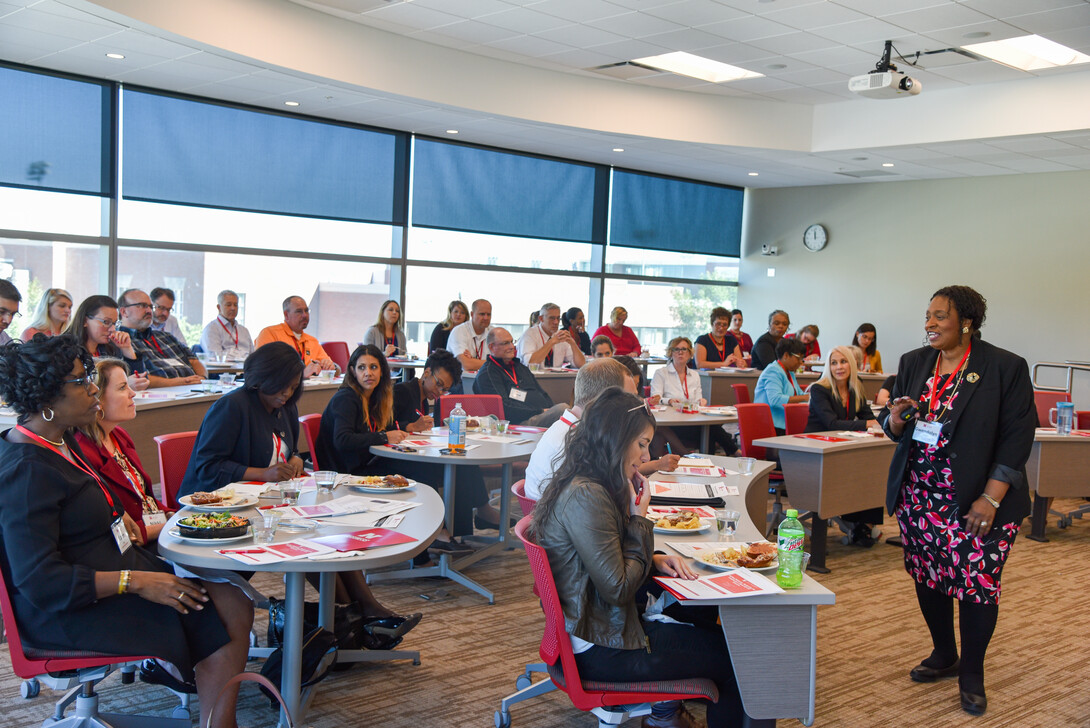
The University of Nebraska–Lincoln’s Center for Executive and Professional Development is offering a series of lunch discussions that will provide insight into current business challenges and how to solve them.
The presentations, which are part of the College of Business’ Power Lunch series, include topics related to retirement planning, project management, communication, diversity and inclusion, effective board management and employee referral hiring programs. The 90-minute sessions, which are led by university faculty, are offered at 11:30 a.m. each Thursday from Feb. 6 to March 12.
Power Lunch sessions cost $54, including lunch and parking validation at the 14th and Avery parking garage. Individuals who purchase multiple Power Lunches can attend sessions for $49 each. Each session will be located in Room 202 of Howard L. Hawks Hall. Registration details are available online.
Topics and presenters featured in the winter series include:
Planning for Retirement Success, Ken Broman, Feb. 6
You have a vision of your retirement and what you would like it to be, but have you prioritized plans in a way that helps incorporate strategies to be successful? Most everyone has heard about the retirement red zone or the orange money for retirement, but be assured there is no pot of gold at the end of a rainbow for retirement. Creating retirement security takes serious planning to be successful. Broman, a certified financial educator and adjunct instructor, will hold an interactive discussion of the retirement planning process and the nuances that face those transitioning into retirement.
Want to Thrive in Operational Excellence?, Vish Reddi, Feb. 13
Every business needs to improve customer outcomes, reduce operational costs and increase performance. In today’s business world, innovation is the new norm. However, not every business manages to implement their new ideas and add value on a consistent basis. Discover some underlying principles of project management that will help you succeed in every project. Reddi, assistant professor of practice in the Durham School of Architectural Engineering and Construction, will lead an active discussion on the project management principles that will provide the most value to your organization.
Communicating Change, Sheri Irwin-Gish, Feb. 20
Change without communication is stressful and challenging, even if the change is greatly needed. Employees and your other audiences need to understand the change to stay committed, connected and engaged. Your audiences — and how you communicate to them — can drive the commitment that leads to successful change. Irwin-Gish, executive director of communications, marketing and external relations for the College of Business, will share why communicating change is necessary and guide you through a method for communicating change effectively.
Shifting Mindsets: Navigating the Complexity of Diversity and Inclusion, Gwendolyn Combs, Feb. 27
Are you looking for ways to enhance organizational effectiveness in the diversity and inclusion domain? Do you wonder why diversity and inclusion outcomes may not fully reach personal and organizational expectations? Combs, associate professor of management and diversity and inclusion scholar, will discuss the obvious and hidden complexities of difference in the workplace when considering these questions. Participants will consider perspectives that can re-direct organizational thinking regarding diversity and inclusion implementation and sustainability strategies. This presentation furthers understanding of this dynamic environment and provides an innovative framework for obtaining more effective outcomes.
Strategies for Effective Board Management, Kathy Farrell, March 5
Having an effective board is the cornerstone of strong corporate governance and can aid in achieving the organization’s overall mission. Yet, many organizations find it challenging to determine the appropriate board composition and how best to engage boards in meaningful and productive ways. Farrell, James Jr. and Susan Stuart Endowed Dean of the College of Business, whose expertise includes corporate finance and executive compensation, will host a discussion of these challenges and how to develop strategies to increase the effectiveness of your board.
Uncover the Nuances of Employee Referral Hiring to Improve Your Referral Program, Jenna Pieper, March 12
Employee referrals are a great source of hire: referred candidates are typically cheaper and faster to hire, and they perform better and stay longer than other hires. Yet, research and subsequently practice has paid little attention to the referrers in this common recruitment practice. Pieper, associate professor of management, will discuss the benefits of employee referral hiring, important nuances associated with the practice, and ways to strategically design and manage employee referral hiring in your organization.







